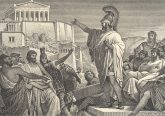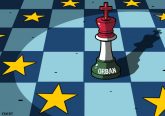Yesterday Geoffrey Gertz commented in this blog on German Finance Minister Wolfgang Schäuble’s statement on elections in Greece. Indeed solving this crisis will be tough, but perhaps international relations theories can offer some advice on what is needed to address current problems. Part of what is downplayed in recent analysis is the impact of the crisis on national emotions and pride. Realism and Liberal Institutionalism propose that national interest drives states to act the way they do. This type of post hoc rationalising to explain outcomes works successfully enough for academics, policy-makers and journalists; however, what they are missing is how such an interest comes about and what fuels it.
Richard Ned Lebow of Dartmouth University published in 2010 ‘Why Nations Fight’. In contrast to many contemporary political scientists Lebow goes back to the ancient Greeks — such as Thucydides, Socrates, Homer, Plato, Aristotle — to draw lessons from their writings. He contends that appetite, spirit and reason are fundamental drives seeking their own ends (Lebow 2010:65; 2006:431). In his conceptualisation, four generic motives lead states to initiate wars: fear, interest, standing and revenge. If the national interest is only one of several motives for a nation to care about, the lesson is clear: Europeans should be much more careful when dealing with a country in a deep financial and political crisis. If the message of the Greek president, accusing the German Finance Minister of insulting his nation (Reuters 2012) is any constellation, then a change of gear by European and particularly German leaders is required urgently.
I am not proposing here that the Greek nation is calling to arms. But looking at the history of war and peace in ancient Greece might help to understand the importance of security, honour, standing and revenge in Greek society. And we should not forget that the Greek and Spartan fighting morale is one that few European countries can challenge[1]. In times of financial austerity, military spending is constrained by the willingness of a society to pay for its security and interests. No country in Europe can really match Greece in its willingness to defend its pride, interest and standing. And for no country in Europe arguably are the costs of economic failure so closely associated with geopolitical implications. In the last ten years (1999-2009) Greece has spent 3.7% of its GDP on defence, more than a percentage point more than any other European nation. France, the United Kingdom and Cyprus, the next in line, are spending between 2.4 to 2.5%. In 2010 the Greek army employed 156,600 military personnel, 8.3% of the personnel in all of Europe and compared to 9.3% from the UK (or 175,690)[2]. If we put this in relation to the population and calculate the share of the armed forces as part of society, 1.48% of Greeks are serving in the army (averaged from 1999-2009). The second in line is Cyprus with 0.99% of its citizens serving in the army, which is over a percentage point more than in France or the UK at 0.48% and 0.34% respectively.
So if military indicators are any guide to how much a nation cares about its pride, standing and honour, then Greece is playing in a league of its own in Europe. Without a doubt it does so in regard to culture, history and developments in philosophy, politics, medicine, mathematics or almost any discipline for that matter if it comes to laying the foundations of Western civilization. This is in stark contrast to the European Union and Germany, often labelled civilian powers where economic interests trump national sentiments (at least since the re-education after World War II). This might be the reason why technocrats in Brussels, German politicians and German newspapers in particular are not able to comprehend how the current situation affects Greek national spirit, citizens and families and hurts their pride beyond imagination. While fear of Greek military retaliation is not of concern, its population will hold and carry the grudge it is feeling at this moment for decades to come.
From talking to Greek friends I am not sure about how much more the Greek nation can take. If Lebow’s cultural theory of International Relations is any guide, then we must take into account the emotive concepts of fear, standing and revenge. Greece is not just a partner, it is a firm part of the European family. Germany received an incredible amount of support in form of the Marshall plan just fifty years ago to rebuild and a chance to start anew. The Greek nation deserves an equally fair chance.
This post was triggered by the political exchange between the Greek President and the German Finance Minister. It should be clear that in communication, it is not just about the content but how messages are transmitted, announced and perceived. German politicians need to be much more careful in how they tune their messages to the Greek audience. Reform will take time, but the Greek nation deserves more respect — and a fair chance.
Hubertus Juergenliemk is a PhD student at the University of Cambridge and a visiting doctoral student at the University of Oxford during the 2011-12 academic year.
[1] The picture that comes to my mind for the Greek spirit is the 2007 fantasy action film 300 by Zack Snyder that surged past hostile critics and industry expectations in tickets sales, showing its match with popular sentiments.
[2] Based on the IISS Military Balance 2011 and the World Bank population estimate for 2010.
References
International Institute for Strategic Studies 2011: The Military Balance. London: Institute for Strategic Studies.
Lebow, Richard Ned 2010: Why Nations Fight. Cambridge: Cambridge University Press.
Lebow, Richard Ned 2008: A Cultural Theory of International Relations. Cambridge: Cambridge University Press.
Lebow, Richard Ned 2006: Fear, interest and honour: outlines of a theory of International Relations. International Affairs 82 no.3: 431-448.
Reuters 2012: Greek president attacks German minister’s “insults”, 14 February 2012: http://www.reuters.com/article/2012/02/15/us-greece-germany-idUSTRE81E1VK20120215
World Bank 2012: Open data for Population, GDP and Defence expenditure as share of GDP, http://data.worldbank.org/, accessed on 17 November 2011








No Comment